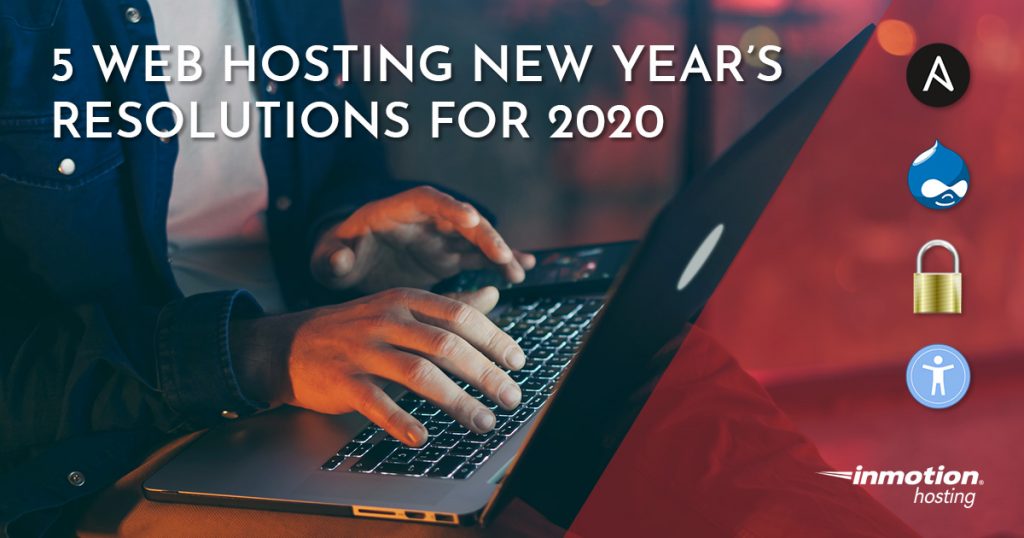
Many New Year’s resolutions are related to better performance in something. For business owners, those goals may be geared toward marketing and sales: search engine optimization (SEO), advertising, or branding in general. Maybe you’ll be creating the first website for your business with a content management system (CMS) such as WordPress or Drupal.
Hopefully, it includes learning more about new General Data Protection Regulation (GDPR), California Consumer Privacy Act (CCPA), and cybersecurity practices.
Moving on, here are five ways to improve not only your web hosting solution, but your overall online branding in 2020 – for free.
Ansible for IT Automation
Do you manage multiple websites across different servers? Maybe you’re maintaining websites for clients using different hosting companies. If so, Ansible playbooks can help you automate website updates and other changes from a central server or workstation.
It doesn’t require learning a new programming language and much of the configuration is set-and-forget. Learn more with our summary: What is Ansible?
Drupal 8 For Your Next Website
If you’re thinking about creating a new website but don’t want to use the popular WordPress CMS because of hack reports, Drupal 8 may be for you. What is Drupal doing that compares to WordPress?
- Better security in the initial install
- Modules (plugins) and themes for customization
- Used by many major organizations including Red Hat, Cisco, and NBA
- Large active community with internet relay chat (IRC) channels
Many warn that it’s geared more toward developers, but you can learn plenty from our Drupal 8 Education Channel.
Want to learn more? Ask about our Drupal Hosting Services.
HTTP Headers for Security
IT security and cyber crime remain hot topics as cyber criminals and cybersecurity specialists work to outdo each other. Regardless of your CMS, adding HTTP security headers to your .htaccess file protects your data and clients’ personally identifiable information (PII) from cross-site scripting (XSS), session hijacking, clickjacking, and other cyber attacks.
- Content Security Policy (CSP) – Specify types of code that can be loaded within your website to mitigate damage if your website is hacked
- Feature Policy – Enable or disable browser features within your website (e.g. location, camera, audio)
- HTTP Strict Transport Security (HSTS) – Force SSL usage (HTTPS) at the browser level to prevent downgrade attacks and similar man-in-the-middle (MITM) attacks
- X-Frames-Options – Block your website from being embedded in other websites with
frame,iframe,object, orembedHTML tags
We cover adding these features in WordPress, Drupal, and Zenphoto without coding in our Support Center.
Domain Name System Security Extensions (DNSSEC)
DNSSEC protects your visitors against DNS spoofing. It does this by only allowing your website to display if your domain’s DNS matches the expected, authenticated network path. Configuration only requires DS records being supported by your:
- Top-level domain (TLD) (e.g. .com or .ch)
- Domain registrar (our steps aren’t on this list yet)
- Web hosting server (such as our Managed VPS / Dedicated server)
For more information, check out our full guide on How to Setup DNSSEC in cPanel Managed Servers for Better Security.
Mandatory plug: Get speed, security, and 24/7 Live Support with our Managed VPS Hosting
Improve Web Accessibility
You may not be familiar with Section 508 accessibility compliance unless you’ve worked in federal IT where it’s mandatory. But everyone can make their online content more “accessible” for people with disabilities:
- Video subtitles and transcripts for the deaf or hard-of-hearing (SDH)
- Image captions and hidden descriptions in other HTML elements (e.g. forms and hyperlinks) read by screen readers for the blind or visually impaired
- Higher contrast between text and background colors for easier readability
- Proper heading hierarchy for easier keyboard navigation
Learn more about how to improve website accessibility.
Want to talk more about web security, accessibility, and hosting goals? Check out our Community Support Center.